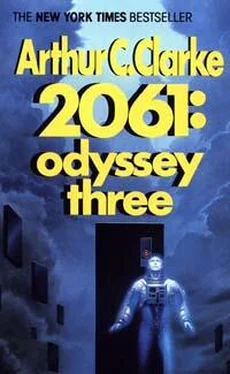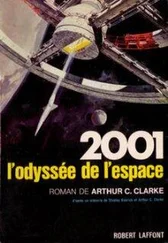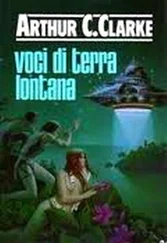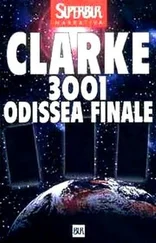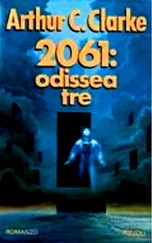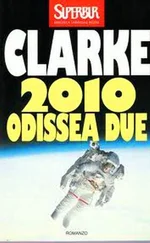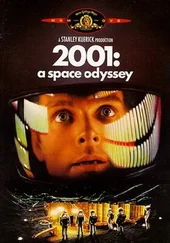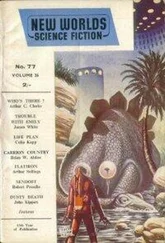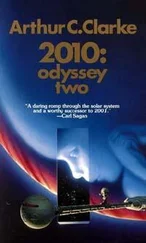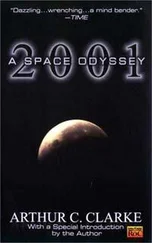Arthur Clarke - 2061 - Odyssey Three
Здесь есть возможность читать онлайн «Arthur Clarke - 2061 - Odyssey Three» весь текст электронной книги совершенно бесплатно (целиком полную версию без сокращений). В некоторых случаях можно слушать аудио, скачать через торрент в формате fb2 и присутствует краткое содержание. Жанр: Фантастика и фэнтези, на английском языке. Описание произведения, (предисловие) а так же отзывы посетителей доступны на портале библиотеки ЛибКат.
- Название:2061: Odyssey Three
- Автор:
- Жанр:
- Год:неизвестен
- ISBN:нет данных
- Рейтинг книги:3 / 5. Голосов: 1
-
Избранное:Добавить в избранное
- Отзывы:
-
Ваша оценка:
- 60
- 1
- 2
- 3
- 4
- 5
2061: Odyssey Three: краткое содержание, описание и аннотация
Предлагаем к чтению аннотацию, описание, краткое содержание или предисловие (зависит от того, что написал сам автор книги «2061: Odyssey Three»). Если вы не нашли необходимую информацию о книге — напишите в комментариях, мы постараемся отыскать её.
2061: Odyssey Three — читать онлайн бесплатно полную книгу (весь текст) целиком
Ниже представлен текст книги, разбитый по страницам. Система сохранения места последней прочитанной страницы, позволяет с удобством читать онлайн бесплатно книгу «2061: Odyssey Three», без необходимости каждый раз заново искать на чём Вы остановились. Поставьте закладку, и сможете в любой момент перейти на страницу, на которой закончили чтение.
Интервал:
Закладка:
'I first suspected it from some chance observations in '57, but didn't really take them seriously for a couple of years. Then the evidence became stronger; for anything less bizarre, it would have been completely convincing.
'But before I could believe that Mount Zeus was made of diamond, I had to find an explanation. To a good scientist – and I think I'm a good one – no fact is really respectable until there's a theory to account for it. The theory may turn out to be wrong – it usually is, in some details at least – but it must provide a working hypothesis.
'And as you pointed out, a million-million-ton diamond on a world of ice and sulphur takes a little explaining. Of course, now it's perfectly obvious and I feel a damn fool not to have seen the answer years ago. Might have saved a lot of trouble – and at least one life – if I had.'
He paused thoughtfully, then suddenly asked Floyd:
'Anyone mention Dr Paul Kreuger to you?'
'No. Why should they? I've heard of him, of course.
'I just wondered. A lot of strange things have been going on, and I doubt if we'll ever know all the answers.
'Anyway, it's no secret now, so it doesn't matter. Two years ago I sent a confidential message to Paul – oh, sorry, I should have mentioned – he's my uncle – with a summary of my findings. I asked if he could explain them – or refute them.
'Didn't take him long, with all the byte-bashing he's got at his fingertips. Unfortunately, he was careless, or someone was monitoring his network – I'm sure your friends, whoever they are, must have a good idea by now.
'In a couple of days, he dug up an eighty-year-old paper in the scientific journal Nature – yes, it was still printed on paper back then! – which explained everything. Well, almost everything.
'It was written by a man working in one of the big labs in the United States – of America, of course – the USSA didn't exist then. It was a place where they designed nuclear weapons, so they knew a few things about high temperatures and pressures.
'I don't know if Dr Ross – that was his name -had anything to do with bombs, but his background must have started him thinking about conditions deep down inside the giant planets. In his 1984 – sorry, 1981 – paper – it's less than a page long, by the way – he made some very interesting suggestions...
'He pointed out that there were gigantic quantities of carbon – in the form of methane, CH4 – in the gas giants. Up to seventeen per cent of the total mass! He calculated that at the pressures and temperatures in the cores – millions of atmospheres – the carbon would separate out, sink down towards the centres and – you've guessed it – crystallize. It was a lovely theory: I don't suppose he ever dreamed that there would be a hope of testing it.
'So that's part one of the story. In some ways, part two is even more interesting. What about some more of that coffee?'
'Here you are; and I think I've already guessed part two. Obviously something to do with the explosion of Jupiter.'
'Not explosion – implosion – Jupiter just collapsed on itself, then ignited. In some ways, it was like the detonation of a nuclear bomb, except that the new state was a stable one – in fact, a minisun.
'Now, very strange things happen during implosions; it's almost as if pieces can go through each other, and come out on the other side. Whatever the mechanism, a mountain-sized piece of the diamond core was shot into orbit.
'It must have made hundreds of revolutions – been perturbed by the gravitational fields of all the satellites – before it ended up on Europa. And conditions must have been exactly right – one body must have overtaken the other, so the impact velocity was only a couple of kilometres a second. If they'd met head-on – well, there might not be a Europa now, let alone Mount Zeus! And I sometimes have nightmares, thinking that it could very well have come down on us...
'The new atmosphere may also have buffered the impact; even so, the shock must have been appalling – I wonder what it did to our Europan friends? – it certainly triggered a whole series of tectonic disturbances, which are still continuing.'
'And,' said Floyd, 'political ones. I'm just beginning to appreciate some of them. No wonder the USSA was worried.'
'Amongst others.'
'But would anyone seriously imagine they could get at these diamonds?'
'We've not done so badly,' answered van der Berg, gesturing towards the back of the shuttle. 'In any case, the mere psychological effect on the industry would be enormous. That's why so many people were anxious to know whether it was true or not.'
'And now they know. What next?'
'That's not my problem, thank God. But I hope I've made a sizeable contribution to Ganymede's science budget.'
As well as my own, he added to himself.
54 – Reunion
'Whatever made you think I was dead?' cried Heywood Floyd. 'I've not felt better for years!'
Paralysed with astonishment, Chris Floyd stared at the speaker grille. He felt a great lifting of his spirits – yet also a sense of indignation. Someone – something – had played a cruel practical joke on him; but for what conceivable reason?
Fifty million kilometres away – and coming closer by several hundred every second – Heywood Floyd also sounded slightly indignant. But he also sounded vigorous and cheerful, and his voice radiated the happiness he obviously felt at knowing that Chris was safe.
'And I've got some more good news for you; the shuttle will pick you up first. It will drop some urgent medical supplies at Galaxy, then hop over to you, and bring you up to rendezvous with us on the next orbit. Universe will go down five orbits later; you'll be able to greet your friends when they come aboard.
'No more now – except to say how much I'm looking forward to making up for lost time. Waiting for your answer in – let's see – about three minutes...'
For a moment, there was complete silence aboard Bill Tee; van der Berg dared not look at his companion. Then Floyd keyed the microphone and said slowly: 'Grandad – what a wonderful surprise – I'm still in a state of shock. But I know I met you here on Europa – I know you said goodbye to me. I'm as certain of that, as I'm sure you were speaking to me just now...
'Well, we'll have plenty of time to talk about it later. But remember how Dave Bowman spoke to you, aboard Discovery? Perhaps it was something like that.
'Now we'll just sit and wait here until the shuttle comes for us. We're quite comfortable – there's an occasional quake, but nothing to worry about. Until we meet, all my love.'
He could not remember when he had last used that word to his grandfather.
After the first day, the shuttle cabin began to smell. After the second, they didn't notice – but agreed that the food was no longer quite so tasty. They also found it hard to sleep, and there were even accusations of snoring.
On day three, despite frequent bulletins from Universe, Galaxy and Earth itself, boredom was beginning to set in, and they had exhausted their supply of dirty stories.
But that was the last day. Before it was over, Lady Jasmine descended, seeking her lost child.
55 – Magma
'Baas,' said the apartment's master comset, 'I accessed that special programme from Ganymede while you were sleeping. Do you wish to see it now?'
'Yes,' answered Dr Paul Kreuger. 'Speed ten times. No sound.'
There would, he knew, be a lot of introductory material he could jump, and view later if he wished. He wanted to get to the action as quickly as possible.
Credits flashed up, and there on the monitor was Victor Willis, somewhere on Ganymede, gesticulating wildly in total silence. Dr Paul Kreuger, like many working scientists, took a somewhat jaundiced view of Willis, though he admitted that he performed a useful function.
Читать дальшеИнтервал:
Закладка:
Похожие книги на «2061: Odyssey Three»
Представляем Вашему вниманию похожие книги на «2061: Odyssey Three» списком для выбора. Мы отобрали схожую по названию и смыслу литературу в надежде предоставить читателям больше вариантов отыскать новые, интересные, ещё непрочитанные произведения.
Обсуждение, отзывы о книге «2061: Odyssey Three» и просто собственные мнения читателей. Оставьте ваши комментарии, напишите, что Вы думаете о произведении, его смысле или главных героях. Укажите что конкретно понравилось, а что нет, и почему Вы так считаете.
